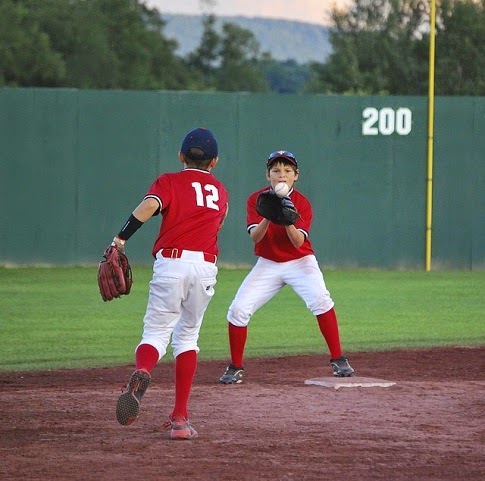Disclosure / Disclaimer: I received this post free of charge, from Sourcebooks PR, for blog posting purposes on this blog. No other compensation, monetary or in kind, has been received or implied for this post. Nor was I told how to post about it
Spring is here and that means soccer, baseball, track, tennis and swimming teams are starting up!
If you are hesitant about putting your kids in sports, this Guest Post might be an eye-opener. I'll be reviewing the author's new book later today as well! Be sure to check out their website for more great tips!
As child psychologists, and parents ourselves, we spend a lot of time discussing the skills and
abilities that are so important for children to practice in the formative years. School requires kids
to practice essential skills in order to get better at things. Times tables, spelling, reading, and
writing skills don’t magically improve; they do so as the byproduct of repetition and practice.
Throughout childhood parents are looking for ways to teach their children the value of hard work, perseverance, communication and a host of other attributes linked to school and personal success. Imagine a way to do this where they will have fun and get to play with their friends too. It is easy to see that getting children exercise and interacting with other kids is good for them, we would like to point out reasons why it will help them in school and life too.
Below you will find four reasons why kids should play sports that don’t have anything to do with
winning shinny trophies.
1. Getting Better Takes Time and Work
With the Instant Gratification Generation, children come to expect everything quickly. Perseverance and working towards a goal can be difficult qualities to instill in this generation. With athletics there is no way around it. To get better you have to practice. To learn a sport a child needs hours of practice and coaching. There are no short-cuts even for children who are more athletically gifted. In fact, you will often see these kids working harder to get better because they see the benefits of practice too.
2. Direct Interpersonal Communication (without electronics!)
Much of the communication between today’s children and teens is through electronic devices, particularly text messaging. With sports they are required to actually talk to each other through direct communication. They need to be aware of their nonverbal cues, such as tone of voice and body language so they don’t come across as a bad sport or simply being rude. Clear communication between a coach and players is essential while teaching the game and to set up and execute plays. Additionally, the opportunity to learn how to support their peers when they make a mistake or do something great is paramount on team sports. Finally, kids communicate with their parents and teachers increasingly more via an electronic device such as e-mail, text, mobile phone, etc., that simply doesn’t happen on the practice field or in games.
3. Low-Cost Risk Taking
Children of this generation have grown accustomed to being rescued any time they encounter a challenge. In this way, they are reluctant to take risks in much of what they do. When they begin playing sports at a young age, it offers them a wonderful opportunity to try something new with very little risk. Nobody plays sports perfectly, especially children, so learning to make mistakes and to learn from them to get better is part of the process. They can try several different sports and see which ones they like. For many children, after one or two days of frustration, things typically get better and they begin to really enjoy their sport. This process teaches them that their first instinct isn’t always right and that they can survive a little discomfort. Teaching children that they shouldn’t quit something because it is difficult is a great life skill.
4. Sports are a Great Way to Learn Teamwork
Playing on a team provides many great opportunities for a child to learn skills that can be difficult to teach in other settings. Team sports require you to think about other people while at the same time working together towards a mutual goal. The idea that when you work together you can achieve greater success epitomizes what we call teamwork. This lesson has broad utility throughout childhood and into adulthood and team sports might simply be the best way to learn it.
Putting it all Together-
We hope these examples provide you insight into the importance of having your children play sports from a young age. The benefits of practice, improved communication, low cost risk-taking, and the value of teamwork are skills that have the potential improve a child’s school performance and self-esteem and the opportunity to gain these important skills while exercising and having fun makes team sports an important opportunity for all kids.
We hope these examples provide you insight into the importance of having your children play sports from a young age. The benefits of practice, improved communication, low cost risk-taking, and the value of teamwork are skills that have the potential improve a child’s school performance and self-esteem and the opportunity to gain these important skills while exercising and having fun makes team sports an important opportunity for all kids.
About the Authors:
Clinical psychologists and international speakers, Darlene Sweetland and Ron Stolberg have decades of experience working with children and their families as well as consulting with teachers, counselors, and administrators. Dr. Stolberg has worked as a psychologist on reality TV shows, such as CBS’s Survivor, and with high-profile professional athletes around issues of performance and substance abuse, speaking internationally about these topics. Dr. Sweetland is the coauthor of Intellectual Disability and Mental Health: A Training Manual in Dual Diagnosis. You can connect with them on Twitter (@Teaching__Kids), You Tube, (http://youtu.be/mH3W0IgHFok and Facebook (https://www.facebook.com/pages/Teaching-Kids-to-Think/1583330055228212 ) as well.





Comments
Post a Comment